Unlock Early Childhood Education Excellence at Murfreesboro Children’s Academy: 7 Inspiring Reasons Parents Trust Us.
Table of Contents
Introduction
Early childhood education represents a critical phase in a child’s cognitive, emotional, and social development, serving as the cornerstone of lifelong learning. At Murfreesboro Children’s Academy, we understand that quality early childhood education shapes the foundation of a child’s future success. Our institution emphasizes a nurturing environment where children can explore, discover, and cultivate a passion for learning. We believe early childhood education is more than just basic instruction—it’s about fostering an environment that supports holistic development.
We recognize the profound influence that early childhood education has on a child’s social skills and emotional intelligence. Our programs are meticulously designed to instill essential interpersonal competencies, such as empathy, teamwork, and effective communication. These attributes, embedded early, significantly benefit children as they navigate more complex social landscapes throughout life. Early childhood education at our academy seamlessly integrates these vital skills into daily interactions and structured learning experiences.
Murfreesboro Children’s Academy is dedicated to excellence in early childhood education, continuously refining our approach based on the latest pedagogical research. We commit to fostering a supportive atmosphere where children feel confident to explore their world, ask questions, and develop self-assurance. Through a well-rounded, intentional curriculum, we strive to make early childhood education not only educationally enriching but also genuinely inspiring, ensuring each child thrives right from the very start.
Highly Qualified Educators Committed to Your Child’s Success
Our commitment to superior early childhood education is embodied in our exceptional team of educators, who bring extensive certifications and specialized training to the classroom. Each educator at Murfreesboro Children’s Academy has dedicated substantial time and effort to mastering innovative pedagogical approaches, deeply rooted in the principles of early childhood education. Their expertise enables them to identify, nurture, and encourage the unique talents and learning styles of each individual child, setting them on a path to sustained academic success.
Understanding that early childhood education requires flexible and dynamic teaching methods, our educators remain attuned to the individual needs and developmental stages of children. They adapt instructional strategies accordingly, ensuring optimal engagement and understanding. Through differentiated instruction, educators foster an inclusive educational environment that supports diverse learning styles and developmental paces. This personalized attention amplifies children’s confidence and curiosity, essential outcomes of quality early childhood education.
Furthermore, our educators instill a genuine enthusiasm for learning by creating inspiring and stimulating classroom experiences. Their dedication extends beyond traditional instruction—educators strive to make each learning moment memorable, motivating children to embrace new challenges eagerly. By cultivating an atmosphere rich with encouragement and support, Murfreesboro Children’s Academy transforms early childhood education into a joyful, lifelong pursuit.
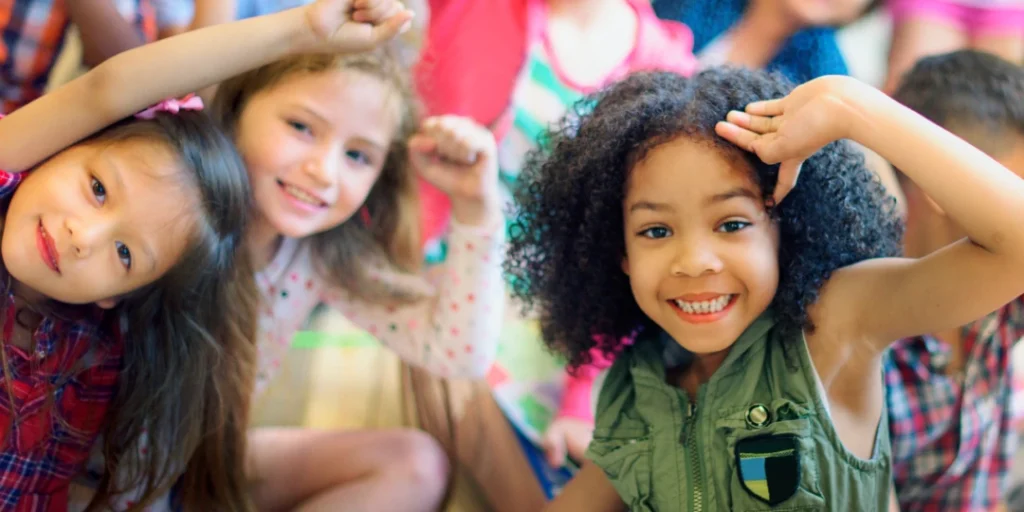
A Curriculum Rooted in Developmental Science
Murfreesboro Children’s Academy proudly utilizes a curriculum grounded firmly in developmental science, a hallmark of excellent early childhood education. Our curriculum reflects extensive research, crafted meticulously to align with key developmental milestones. This strategic alignment ensures that each child experiences tailored, age-appropriate learning opportunities designed to optimize their cognitive, social, and emotional advancement. By relying on evidence-based strategies, we maximize the efficacy of our early childhood education programs.
Each curriculum component at our academy has been carefully curated to stimulate holistic growth, promoting a balanced development of intellectual capacities alongside emotional and social skills. We understand that early childhood education is most effective when educational challenges correspond directly with the child’s current developmental stage. By providing engaging activities and explorations suited to their abilities, we encourage students to tackle progressively complex tasks with confidence and enthusiasm.
Moreover, our research-driven approach to early childhood education ensures regular evaluation and adaptation of teaching materials and methodologies. By continuously assessing developmental progress, educators can adjust lessons to maintain optimal challenge levels, ensuring sustained advancement and growth. Murfreesboro Children’s Academy’s unwavering commitment to developmental science equips each child with the necessary tools and skills to thrive academically, emotionally, and socially, affirming our reputation as a leader in exemplary early childhood education.
Emphasis on Social-Emotional Development
In the realm of early childhood education, cultivating emotional intelligence significantly impacts lifelong success. At Murfreesboro Children’s Academy, our educators deeply understand the critical role social-emotional skills play in shaping children’s overall development. Through intentional instructional strategies and tailored interventions, our early childhood education professionals consistently reinforce empathy, cooperation, and effective communication, laying a robust foundation for enduring social capabilities.
Furthermore, our commitment to exceptional early childhood education practices is demonstrated by our specialized programs designed explicitly to develop emotional resilience and interpersonal effectiveness. Educators integrate activities that stimulate emotional understanding and self-regulation, such as guided group interactions, reflective discussions, and cooperative projects. This comprehensive approach to early childhood education fosters children’s ability to empathize, navigate complex social situations, and build meaningful, positive relationships with their peers.
Ultimately, at Murfreesboro Children’s Academy, we recognize that the value of social-emotional skills transcends the classroom, permeating every aspect of life. Our early childhood education methodologies meticulously weave emotional intelligence training into daily interactions and structured lessons. By prioritizing emotional development as central to the educational experience, we ensure children cultivate vital life skills, empowering them to thrive academically, socially, and emotionally throughout their lives.
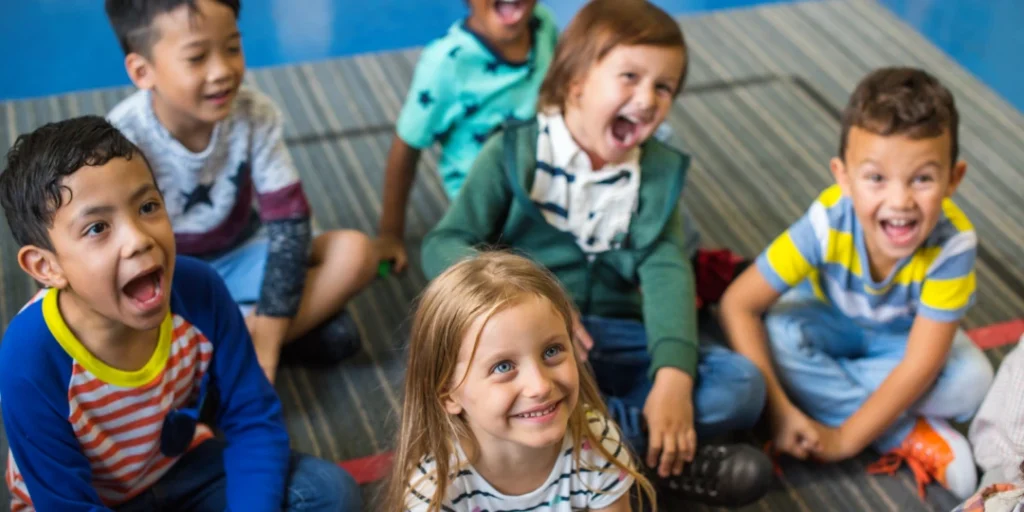
A Safe and Nurturing Environment
At Murfreesboro Children’s Academy, creating a secure and supportive environment is fundamental to the efficacy of our early childhood education programs. We meticulously design our facilities with an unwavering commitment to child safety, integrating advanced security measures and thoughtful architectural planning to guarantee children feel secure, confident, and comfortable. Our priority is to ensure that children can freely explore and discover, enhancing their cognitive and emotional growth within a safe, protected setting.
The physical spaces within our academy are thoughtfully constructed to stimulate engagement and curiosity, integral elements in premier early childhood education. Classrooms and recreational areas are structured to promote independent exploration while maintaining high safety standards. Through careful environmental design, educators foster a supportive atmosphere conducive to discovery, creativity, and meaningful peer interactions, crucial components for successful early childhood education.
Beyond physical safety, Murfreesboro Children’s Academy emphasizes emotional nurturing. Our educators establish a warm, inviting atmosphere where each child feels valued and respected. By reinforcing positive behaviors and building trusting relationships, our approach to early childhood education ensures emotional well-being, enabling children to engage fully and confidently in learning experiences that support their overall development and academic readiness.
Innovative Play-Based Learning
In the context of advanced early childhood education, we firmly believe that learning should be intrinsically joyful and stimulating. Murfreesboro Children’s Academy embraces an innovative play-based curriculum designed to ignite children’s natural curiosity and enthusiasm for learning. Purposeful play activities serve as catalysts for developing creativity, problem-solving abilities, and critical thinking skills core competencies that underpin lifelong learning and achievement.
Our educators meticulously craft play-based experiences that align with developmental milestones, ensuring meaningful educational interactions within a playful context. Activities such as imaginative role-play, hands-on exploration, and collaborative problem-solving challenges facilitate deep engagement and active participation, vital characteristics of exemplary early childhood education. This approach not only enhances cognitive development but also significantly bolsters social-emotional growth and interpersonal skills.
Furthermore, play-based learning at Murfreesboro Children’s Academy ensures that educational experiences resonate deeply with children. By framing academic content within playful scenarios, our early childhood education approach effectively bridges abstract concepts with real-world applications. The result is a dynamic learning environment where children eagerly embrace new challenges, cultivating a genuine passion for discovery and continuous personal growth throughout their educational journey.
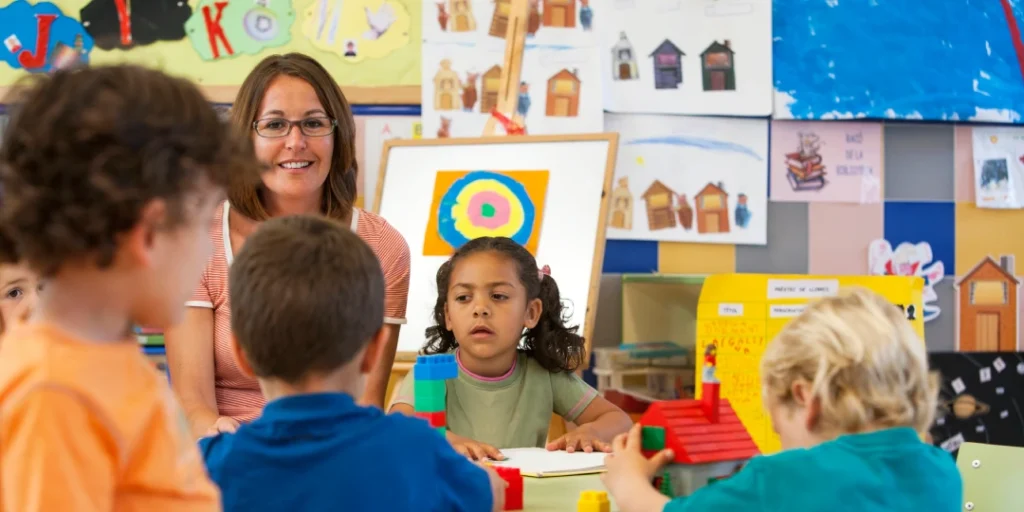
Strong Family Partnerships
Effective early childhood education thrives on collaborative partnerships with families, an integral element of our educational philosophy at Murfreesboro Children’s Academy. Recognizing that parents play a pivotal role in a child’s educational journey, we prioritize regular communication and meaningful engagement to create a cohesive, supportive educational environment. This collaborative framework ensures alignment between home and school experiences, enhancing children’s overall development and learning outcomes.
Our structured approach to early childhood education involves consistent updates through parent-teacher meetings, progress reports, and digital communication platforms. By keeping families informed about their children’s academic progress and developmental milestones, we empower parents to actively participate in reinforcing educational goals at home. Additionally, family engagement events, workshops, and seminars further strengthen the home-school connection, fostering a community-centric approach to early childhood education.
At Murfreesboro Children’s Academy, our educators actively seek and value family insights and feedback, recognizing the importance of diverse perspectives in shaping effective early childhood education. This ongoing dialogue ensures continuous improvement and personalized support for each child, reflecting our unwavering commitment to nurturing strong, collaborative relationships with families. Through active partnership, we create a robust educational foundation that propels children toward lasting success.
Outstanding Enrichment Programs
At Murfreesboro Children’s Academy, we understand that exceptional early childhood education transcends traditional academic boundaries. Our enrichment programs are meticulously crafted to foster a multifaceted developmental environment. By integrating diverse disciplines such as fine arts, music appreciation, and immersive nature exploration, our early childhood education framework offers children expansive opportunities to cultivate creativity, emotional intelligence, and cognitive flexibility.
Through our dedicated art and music initiatives, children actively engage in creative self-expression, a cornerstone of robust early childhood education. These activities stimulate imaginative thinking, develop fine motor skills, and enhance sensory processing capabilities. Furthermore, exposure to musical rhythms and artistic mediums promotes neurological growth and emotional regulation, laying a strong foundation for future academic and personal successes within our comprehensive approach to early childhood education.
Additionally, our enrichment curriculum emphasizes experiential learning through community involvement and nature-based programs. By participating in activities designed around environmental awareness and local community interaction, children develop a profound sense of responsibility and interconnectedness. This community-centric approach to early childhood education fosters empathy, social engagement, and environmental stewardship. Ultimately, the holistic design of our enrichment programs significantly broadens children’s horizons, preparing them comprehensively for lifelong learning.
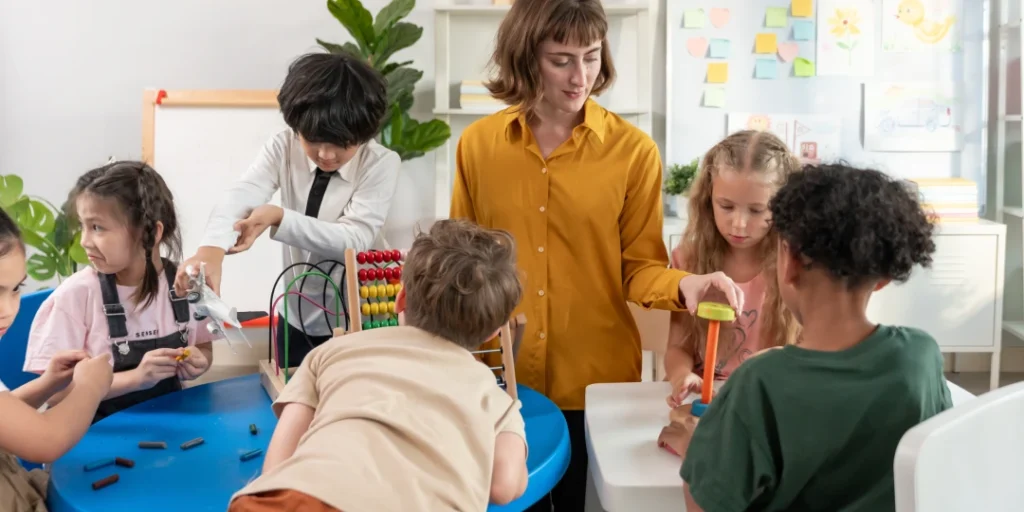
Frequently Asked Questions (FAQs)
Q: What ages does Murfreesboro Children’s Academy serve?
A: Murfreesboro Children’s Academy offers specialized Early childhood education programs designed to accommodate children from infancy through Pre-K. Each developmental stage is supported by carefully curated educational activities and structured curricula. Our Early childhood education programs foster cognitive, emotional, social, and physical growth, providing children with foundational skills essential for lifelong learning and success.
Q: Are your teachers certified?
A: Absolutely. Our educators at Murfreesboro Children’s Academy are thoroughly certified professionals with extensive experience and specialized training in Early childhood education. They hold relevant state certifications and actively participate in continuous professional development opportunities, ensuring that they remain at the forefront of the latest pedagogical practices and methodologies specific to Early childhood education.
Q: What safety measures do you implement?
A: Safety is paramount at Murfreesboro Children’s Academy. Our commitment to safeguarding every child within our Early childhood education environment includes secure, monitored facilities, comprehensive staff background checks, rigorous safety training, and strict compliance with health and hygiene standards. Additionally, all areas are regularly inspected to ensure adherence to best practices, maintaining a secure, nurturing atmosphere conducive to effective Early childhood education.
Q: How do you involve families in the learning process?
A: At Murfreesboro Children’s Academy, we believe that active parental involvement significantly enhances Early childhood education outcomes. To facilitate this, we maintain transparent, ongoing communication with families, regularly providing updates on their child’s developmental milestones and educational achievements. Additionally, we host family engagement events, informational workshops, and provide ample opportunities for direct parental participation in classroom activities, creating a collaborative community focused on optimizing each child’s Early childhood education experience.
Conclusion
Invest in Your Child’s Future Today by selecting Murfreesboro Children’s Academy represents a strategic investment in superior early childhood education, promising invaluable returns for your child’s developmental trajectory. Our institution prioritizes educational excellence by consistently employing evidence-based pedagogical methods that effectively nurture academic and emotional growth. With our distinctive emphasis on creating stimulating learning environments, we set the stage for enduring intellectual curiosity, resilience, and achievement through targeted early childhood education initiatives.
Moreover, the nurturing atmosphere at Murfreesboro Children’s Academy ensures that each child feels valued and supported, essential aspects for effective early childhood education. We build meaningful relationships through personalized attention, enabling children to thrive academically, socially, and emotionally. Our dedicated educators employ responsive teaching strategies tailored to individual learning styles, fostering confidence and independence from the earliest stages of education.
Investing in your child’s future today through Murfreesboro Children’s Academy ensures they will be equipped with the necessary skills, knowledge, and emotional intelligence to succeed both academically and in life. Our holistic approach to early childhood education provides a comprehensive foundation that empowers children to confidently navigate future educational milestones and personal endeavors. Choose excellence, choose nurturing, choose the best possible start in life for your child with Murfreesboro Children’s Academy.
Early Learning Excellence: 5 Inspiring Reasons Parents Choose Murfreesboro Children’s Academy
Table of Contents
Introduction: A Place Where Young Minds Flourish
Early learning at Murfreesboro Children’s Academy is more than an academic journey—it is the beginning of a lifelong love for discovery. From the moment a child steps through the doors, they are immersed in an environment that encourages exploration, curiosity, and joyful engagement. The academy’s approach to early learning allows children to ask questions, seek answers, and develop a deep sense of wonder about the world around them.
The value of early learning is evident in each carefully planned day, where activities are designed to engage young minds at every developmental stage. Teachers craft experiences that blend guided instruction with opportunities for independent exploration, ensuring that children can develop their unique interests and skills. Whether it is a science experiment, a storytelling session, or a nature walk around the campus, each moment is an invitation to learn in meaningful, memorable ways.
At Murfreesboro Children’s Academy, early learning excellence shapes confident learners who are ready to embrace their future. The academy believes that a strong foundation in early learning equips children not only with academic skills but also with resilience, adaptability, and a genuine love for learning. This commitment to nurturing every child’s potential ensures that families can trust their child’s first educational experience will be both enriching and empowering.
A Nurturing Environment That Feels Like Home
Early learning thrives in environments where children feel safe, seen, and valued, and Murfreesboro Children’s Academy has crafted its spaces to reflect this understanding. From the warm greetings each morning to the bright, thoughtfully arranged classrooms, children enter an environment where they know they belong. The comfort of familiar routines paired with the excitement of daily discoveries helps children develop a sense of security as they navigate the world of early learning.
Inside each classroom, early learning is supported by carefully chosen materials and spaces that encourage exploration while providing comfort. Cozy reading nooks invite children to settle in with a story, while interactive sensory stations encourage tactile learning and problem-solving. Natural light fills the rooms, creating a warm, welcoming atmosphere that feels more like a home than a traditional classroom. This environment empowers children to take risks in their learning, knowing they have the support they need to grow.
Early learning at Murfreesboro Children’s Academy extends beyond the physical environment to the emotional connections built each day. Teachers foster a nurturing culture where kindness, respect, and empathy are modeled and encouraged. These relationships help children develop confidence, social skills, and a strong sense of self as they explore their world. In this nurturing environment, early learning is not only about academics—it is about building the emotional and social foundations that will carry children into the next stages of their education and life.
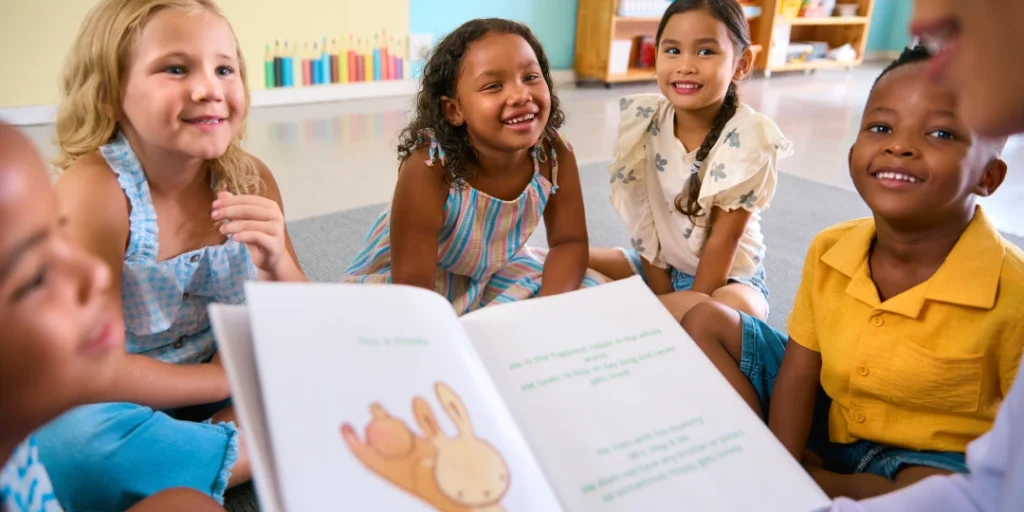
Skilled Educators Who Champion Growth
Early learning flourishes under the guidance of skilled educators who understand how to nurture each child’s potential. At Murfreesboro Children’s Academy, teachers bring a wealth of knowledge in child development, curriculum design, and individualized learning strategies, ensuring that every child receives personalized support. They approach early learning with intention, using each interaction as an opportunity to encourage curiosity, build confidence, and cultivate essential skills that extend far beyond the classroom.
These educators recognize that early learning is not a one-size-fits-all journey. Each child arrives with unique interests, strengths, and ways of engaging with the world, and teachers at Murfreesboro Children’s Academy take the time to learn what motivates and excites each learner. Through careful observation and thoughtful guidance, they create experiences that connect with children on a personal level, making early learning both relevant and rewarding. Small group activities, hands-on projects, and one-on-one moments become opportunities to foster deeper understanding while maintaining a joyful learning environment.
Parents often remark on the genuine care and commitment they see from the educators at Murfreesboro Children’s Academy. Early learning here is enriched by teachers who celebrate every milestone and encourage resilience when challenges arise. Their encouragement builds trust, allowing children to take risks in their learning and embrace new experiences with enthusiasm. It is this dedication to nurturing growth that transforms the early learning experience into a foundation for lifelong success.
Purposeful Play That Fuels Discovery
At Murfreesboro Children’s Academy, early learning is seamlessly woven into purposeful play, where children’s natural curiosity becomes the driving force for discovery. Play is not viewed as a break from learning but as a critical method through which children develop language, problem-solving, and social skills. Through thoughtfully designed play experiences, children engage with concepts in a way that feels organic, joyful, and meaningful, ensuring early learning is both effective and enjoyable.
The academy’s approach to purposeful play allows children to experiment, imagine, and create while building essential cognitive and social-emotional skills. Whether constructing elaborate block structures, engaging in pretend play, or exploring sensory activities, children learn to collaborate, negotiate, and think critically. These play-based learning opportunities align with developmental science, ensuring that early learning at Murfreesboro Children’s Academy supports the whole child while preserving the wonder that comes with exploration.
Purposeful play also allows educators to integrate early learning objectives seamlessly into everyday activities. Teachers guide play with gentle prompts and questions that encourage deeper thinking, helping children connect their discoveries to real-world concepts. This blend of structure and freedom empowers children to take ownership of their learning while developing the skills needed for future academic success. At Murfreesboro Children’s Academy, purposeful play ensures that early learning is dynamic, engaging, and rooted in the joy of discovery.
Robust Curriculum Grounded in Developmental Science
Early learning at Murfreesboro Children’s Academy is supported by a robust curriculum grounded in research and best practices in early childhood education. This curriculum goes beyond rote learning, focusing instead on nurturing curiosity, critical thinking, and emotional intelligence in every child. It is designed to ensure that children not only meet developmental milestones but also develop a genuine love for learning that will serve them throughout their educational journey.
The curriculum integrates core academic areas such as literacy, numeracy, and science with creative arts, music, and movement to create a balanced early learning experience. Lessons are delivered in ways that honor each child’s learning style, using hands-on activities, storytelling, and exploration to deepen understanding and retention. By weaving early learning goals into engaging, interactive experiences, Murfreesboro Children’s Academy ensures that children build foundational skills while remaining active participants in their education.
Parents can trust that the robust curriculum at Murfreesboro Children’s Academy prepares their children for the transition to kindergarten and beyond. Teachers use ongoing assessments to tailor instruction, ensuring that each child’s progress is closely monitored and supported. This approach to early learning creates confident, capable learners who enter the next stage of their education with a strong academic foundation and the ability to adapt and thrive in new environments.
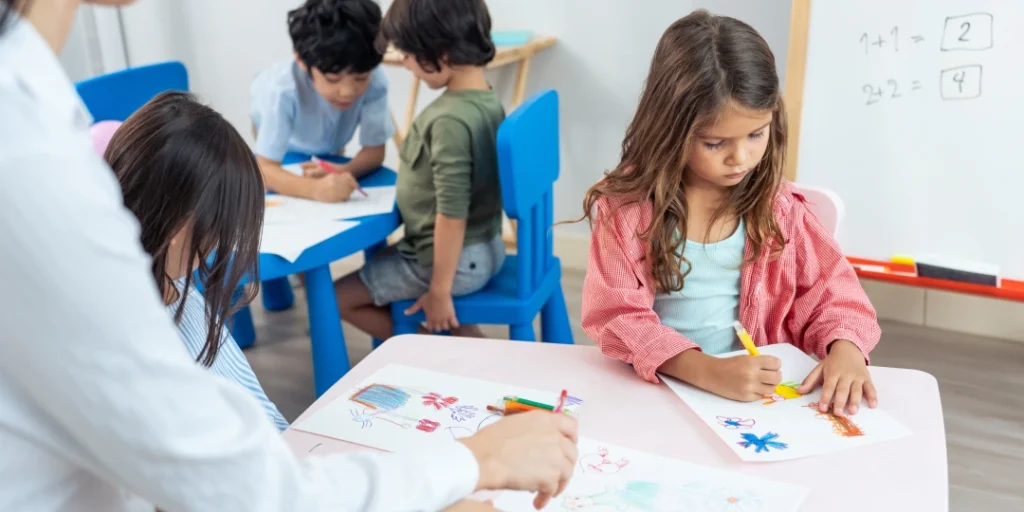
Family Partnerships That Foster Confidence
Early learning thrives when parents and educators work together as partners, creating a network of support for every child. At Murfreesboro Children’s Academy, families are seen as vital collaborators in the early learning journey, ensuring consistency and encouragement both at home and in the classroom. Parents are welcomed into the learning process through open communication, transparent updates, and opportunities to engage in their child’s day-to-day experiences.
Regular newsletters, progress conferences, and informal conversations during drop-off and pick-up keep parents informed and involved in their child’s development. Early learning milestones are celebrated together, allowing families to see firsthand the growth their children are experiencing. This ongoing dialogue empowers parents to reinforce early learning concepts at home, strengthening the skills and confidence their children build within the academy’s nurturing environment.
Family events, workshops, and volunteer opportunities further enrich the partnership between home and Murfreesboro Children’s Academy. These experiences not only build community but also help parents feel connected to their child’s early learning journey, fostering trust and confidence in their choice of care. By prioritizing family partnerships, the academy ensures that early learning is a collaborative effort, supporting children with a strong, unified foundation for growth.
Safety and Security That Give Parents Peace of Mind
A safe, secure environment is the bedrock upon which effective early learning is built. At Murfreesboro Children’s Academy, safety is not an afterthought; it is a daily commitment that ensures children can explore, learn, and grow with confidence. From secure entry systems to vigilant staff supervision, every detail of the environment is designed to protect and nurture young learners while they engage in early learning activities.
Classrooms and common areas are meticulously maintained to provide clean, organized spaces where children can participate in early learning without unnecessary distractions or hazards. Health and wellness protocols, including daily check-ins and clear hygiene routines, further safeguard children’s well-being, creating an environment where parents can leave their children each day with peace of mind. This commitment to safety allows children to focus on what truly matters—immersing themselves fully in the joy of early learning.
Beyond physical safety, Murfreesboro Children’s Academy fosters emotional security through nurturing relationships and consistent routines. Teachers provide reassurance and encouragement, creating a predictable environment where children feel safe to take risks, ask questions, and explore new ideas. This emotional safety is essential for early learning, allowing children to develop resilience and confidence as they navigate their world.
Enrichment Beyond the Classroom Walls
Early learning at Murfreesboro Children’s Academy does not stop at the classroom door; it reaches into the community and the natural world, creating a vibrant learning environment that fuels curiosity. Nature walks become living science lessons as children observe insects, collect leaves, and discuss the changing seasons. Community outings, whether to the local library or a nearby farm, bring early learning into real-life contexts, helping children connect what they learn in the classroom to the world they see around them. Seasonal celebrations provide opportunities to explore cultural traditions and foster a sense of belonging, making early learning an exciting journey of discovery that extends far beyond paper and pencils.
This commitment to enrichment is grounded in the understanding that early learning must address the whole child—mind, body, and spirit. Activities like gardening allow children to develop responsibility and patience as they care for plants, while also connecting to science and the natural environment. Music sessions encourage rhythm, listening, and self-expression, while art projects allow children to translate their ideas into tangible creations, fostering confidence and creativity. These experiences are intentionally woven into the academy’s curriculum to reinforce early learning goals while ensuring children remain engaged, curious, and excited to participate in each day’s discoveries.
Community involvement is a cornerstone of the early learning experience at Murfreesboro Children’s Academy, providing children with valuable opportunities to develop empathy and social awareness. Meeting community helpers like firefighters, nurses, and local artists introduces children to different roles within their community, inspiring respect and a sense of connection. Participating in acts of kindness, such as creating cards for local seniors or collecting items for food drives, nurtures a spirit of giving and gratitude. These moments help children understand that early learning is not just about academic growth but also about becoming kind, responsible members of their community, shaping them into compassionate individuals who are eager to contribute to the world around them.

A Community Committed to Lifelong Learning
At Murfreesboro Children’s Academy, early learning is part of a broader commitment to fostering a lifelong love of education within each child. The academy nurtures an environment where learning is celebrated, curiosity is encouraged, and growth is continuous. This commitment to lifelong learning begins with the smallest discoveries during early learning activities and evolves into a mindset that children carry with them throughout their educational journey.
The educators at Murfreesboro Children’s Academy model a passion for learning by participating in ongoing professional development and applying the latest research in early childhood education within their classrooms. This commitment to staying informed ensures that early learning strategies remain effective, innovative, and responsive to the evolving needs of young learners. It also demonstrates to children that learning is a valuable, never-ending pursuit.
The academy also creates opportunities for children to become active participants in their learning, encouraging them to ask questions, explore new ideas, and seek out knowledge with confidence. This approach to early learning helps children develop critical thinking skills, resilience, and adaptability—traits that are essential for success both in school and in life. By fostering a culture of lifelong learning, Murfreesboro Children’s Academy ensures that children develop a mindset of curiosity and growth that will serve them well beyond their early years.
Preparing Children for Kindergarten and Beyond
Early learning at Murfreesboro Children’s Academy is carefully designed to prepare children for the transition to kindergarten and the academic challenges that follow. The curriculum integrates foundational skills in literacy and numeracy with opportunities for social and emotional growth, ensuring children are equipped with the tools they need to thrive in their next educational environment. Through purposeful instruction and engaging activities, children develop the confidence and competence that support school readiness.
Beyond academics, the academy places a strong emphasis on the social-emotional aspects of early learning. Children learn how to express their emotions, collaborate with peers, and navigate challenges with resilience and adaptability. These skills are critical for kindergarten success, as they help children adjust to new routines, form positive relationships with teachers and classmates, and confidently engage in new learning opportunities.
The academy’s commitment to kindergarten readiness extends to families as well. Parents receive guidance and resources to support their child’s transition, ensuring consistency between home and school. By preparing children comprehensively for kindergarten and beyond, Murfreesboro Children’s Academy empowers families with confidence in their child’s readiness while giving children the strong foundation they need to embrace the future with excitement and curiosity.

Conclusion: Invest in Your Child’s Bright Future
Choosing the right early learning environment is one of the most important decisions parents will make, setting the tone for a child’s educational path and their view of learning itself. At Murfreesboro Children’s Academy, early learning is approached with care, intention, and a deep commitment to nurturing every aspect of a child’s growth. Here, early learning is more than mastering letters and numbers; it is about cultivating curiosity, encouraging exploration, and building the emotional and social foundations that will serve children for years to come.
Parents who entrust their children to Murfreesboro Children’s Academy are choosing a partner dedicated to supporting their child’s development in a safe, engaging environment. The academy’s educators work closely with families to create a consistent, responsive approach to early learning that honors each child’s unique personality and needs. Through hands-on learning, collaborative projects, and purposeful play, children gain not only academic skills but also resilience, empathy, and confidence—qualities that will shape their ability to thrive in school and in life.
Early learning at Murfreesboro Children’s Academy is a gift that extends far beyond the preschool years. It is a foundation that shapes how children see themselves as learners and how they engage with the world around them. By providing a place where children are valued, challenged, and supported, the academy helps each child develop a love for learning that lasts a lifetime. For parents seeking a nurturing, high-quality environment that will prepare their children for a bright, promising future, Murfreesboro Children’s Academy is the clear choice, offering a place where early learning excellence is not just a goal but a daily reality.
Read MoreNurturing Young Minds: Inside Murfreesboro Children’s Academy’s Innovative Approach to Early Education
Table of Contents
Introduction: Redefining Early Education
Murfreesboro Children’s Academy redefines what early education can achieve by treating the preschool years not as a precursor to “real” learning, but as the critical foundation of a child’s intellectual, emotional, and social life. This elevated approach situates MCA not just as a childcare provider, but as an institution focused on developmental excellence. While many programs emphasize routine or rote activities, Murfreesboro Children’s Academy engages children in an enriched, thoughtfully curated environment that honors each stage of their early development.
Located in a community that values family, growth, and education, Murfreesboro Children’s Academy serves as a beacon for parents seeking more than a standard curriculum. The academy crafts experiences designed to cultivate resilience, empathy, and a sense of wonder in its students. This is achieved through meticulously designed classrooms, nurturing educators, and a philosophy that values process over product. Each day at MCA offers children opportunities to interact with the world in ways that ignite curiosity and foster confidence.
What distinguishes Murfreesboro Children’s Academy is its understanding that early education is about shaping character and capacity as much as it is about introducing academics. In this view, childhood is not merely a preparation for adulthood, but a vibrant period of life deserving of dignity, joy, and intentional cultivation. Through this lens, MCA orchestrates a learning rhythm—steady, meaningful, and holistic—setting children on a trajectory toward lifelong success and well-being.
The Philosophy Behind Murfreesboro Children’s Academy’s Pedagogical Framework
The pedagogical philosophy of Murfreesboro Children’s Academy is rooted in the belief that children are inherently capable and innately driven to explore the world around them. Drawing inspiration from time-honored educational methodologies such as Montessori, Reggio Emilia, and constructivist models, MCA frames learning as an active, inquiry-based process. Rather than presenting information for passive consumption, educators at MCA encourage children to ask questions, test ideas, and construct their own understanding of the world. This approach honors the individuality of each child and prioritizes critical thinking from the earliest stages of development.
At Murfreesboro Children’s Academy, classrooms are purposefully designed to function as laboratories of learning—dynamic, adaptable spaces that respond to the evolving interests and needs of the children. Educators function not as directors, but as guides and collaborators. They observe carefully, pose thought-provoking questions, and offer resources that deepen each child’s exploration. This pedagogical stance fosters autonomy and builds the foundational skills for independent learning. It also reflects a broader commitment to nurturing a child’s intrinsic motivation, rather than conditioning them to perform for external rewards.
The emphasis on intentional inquiry at Murfreesboro Children’s Academy cultivates a culture where curiosity is celebrated and mistakes are viewed as essential to growth. This philosophy creates an environment where children are safe to express ideas, challenge assumptions, and engage deeply with complex topics—even at a very young age. By prioritizing discovery over memorization and exploration over rigid structure, MCA ensures that students not only acquire knowledge but also learn how to learn. This creates a robust foundation for both academic achievement and emotional resilience in future educational environments.
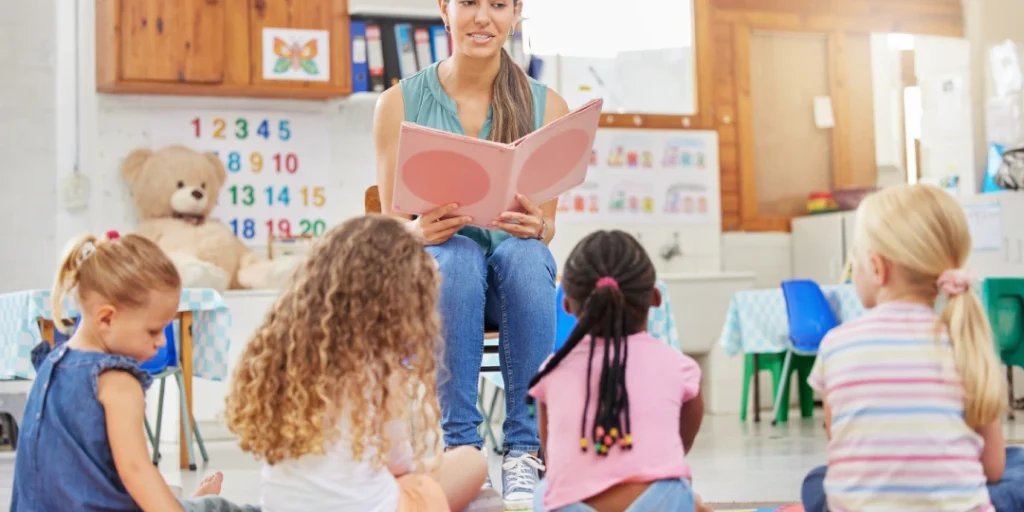
A Curriculum Rooted in Cognitive and Emotional Development
Murfreesboro Children’s Academy implements a curriculum that recognizes the inseparability of intellectual growth and emotional well-being. Learning is not compartmentalized but viewed as a comprehensive experience that activates both hemispheres of a child’s development. At MCA, activities are intentionally designed to stretch the young brain’s potential—enhancing language acquisition, executive functioning, memory processing, and problem-solving—while also cultivating emotional literacy and self-awareness. These twin priorities ensure that children leave not only smarter but stronger in character.
The daily rhythm at Murfreesboro Children’s Academy includes carefully sequenced activities that stimulate emerging cognitive faculties. Storytelling circles enhance narrative memory and vocabulary. Structured reasoning games refine logic and sequencing. Music, rhythm, and movement sessions activate pattern recognition and motor coordination. But more than ticking boxes of traditional academia, MCA seeks to inspire joy in learning—where children experience the thrill of discovery and the satisfaction of making connections, not merely reciting facts.
Equally important is the academy’s unwavering emphasis on emotional development. From peer conflict resolution to identifying and expressing feelings, Murfreesboro Children’s Academy fosters environments where social-emotional growth is intentionally guided. Teachers model empathy and coach children through real-life interactions, ensuring they gain tools to navigate relationships and articulate emotions effectively. This emotional scaffolding not only nurtures happier children but also sets the groundwork for empathy, self-regulation, and cooperative learning—hallmarks of future success both in and beyond the classroom.
Embracing Play as a Foundation for Learning
At Murfreesboro Children’s Academy, play is not a reward for completing “real work”—it is the work. MCA champions the idea that play is the most powerful and developmentally appropriate learning vehicle available to young minds. Through play, children develop essential cognitive schemas, learn social negotiation, and engage in abstract thinking. MCA structures its day to allow for both guided and unstructured play, creating opportunities for children to experiment, reflect, and refine their understanding through active, joyful engagement.
Educational play at Murfreesboro Children’s Academy is richly layered. A child constructing a tower is not merely stacking blocks—they are exploring concepts of balance, gravity, spatial awareness, and collaboration. A make-believe post office or grocery store becomes a fertile ground for developing narrative skills, numeracy, and social roles. Teachers facilitate these moments with subtle interventions, asking probing questions or introducing materials that enhance the depth and direction of play without hijacking the child’s autonomy.
Beyond its cognitive benefits, play at MCA also serves as a practice ground for critical life skills. Through imaginative scenarios and shared activities, children learn conflict resolution, turn-taking, leadership, and compromise. Murfreesboro Children’s Academy views these skills not as tangential, but as integral to a well-rounded education. By treating play as both a science and an art, MCA builds a culture where joy and rigor coexist—making learning both meaningful and memorable.
Multisensory Learning Environments that Stimulate Growth
Murfreesboro Children’s Academy understands that young children engage with the world through all their senses—and so it crafts environments that respond to this instinctual modality of learning. Rather than relying solely on visual or auditory instruction, MCA designs classrooms and play areas that stimulate touch, smell, movement, and even taste. The result is a rich, immersive educational experience that deepens retention, nurtures creativity, and accommodates varied learning styles.
Each classroom at Murfreesboro Children’s Academy is a symphony of sensory inputs. Soft lighting, textured surfaces, calming scents, and natural elements combine to create spaces that are both stimulating and soothing. Sensory tables brimming with rice, beans, or water allow for fine motor exploration and early math concepts like volume and measurement. Art stations offer a range of materials—clay, fabric, wood, paint—encouraging expression through texture and form. These environments are not incidental; they are purpose-built to expand the ways children engage with content.
The multisensory approach also supports inclusive education, recognizing that not all children absorb information in the same way. For the tactile learner, a letter traced in sand may be more meaningful than one printed on paper. For the kinesthetic child, jumping through a sequence of numbers etched on the floor may unlock mathematical fluency. Murfreesboro Children’s Academy tailors its instruction to meet children where they are, offering a learning experience that is not only effective but profoundly human. Through these carefully designed environments, MCA nurtures minds, bodies, and spirits in tandem.

The Role of Educators: Mentors, Not Just Instructors
At Murfreesboro Children’s Academy, educators are not confined to the traditional role of instructors delivering predefined lessons. Instead, they are seen as mentors and co-learners—facilitators of growth who adapt and respond to each child’s evolving needs. These educators act with intentionality and emotional intelligence, observing closely, listening deeply, and offering meaningful interventions at just the right moment. Their work is not to impose knowledge but to provoke thought, nurture curiosity, and support self-discovery.
Teachers at Murfreesboro Children’s Academy engage in a continual process of reflection and professional development. They study developmental patterns, remain informed by contemporary pedagogical research, and collaborate to refine their practices. Each educator is trained to identify individual learning styles, adapt instruction accordingly, and scaffold children’s thinking without diminishing their agency. This balance between guidance and autonomy is a hallmark of MCA’s professional culture—where teaching is a dynamic, responsive craft rather than a static routine.
The emotional presence of teachers at MCA is just as impactful as their instructional acumen. They cultivate trust, model respectful behavior, and provide secure attachment figures for young children navigating the complexities of group settings. By fostering emotionally safe and intellectually rich environments, Murfreesboro Children’s Academy ensures that its educators are not just delivering lessons but shaping lives—one mindful interaction at a time.
Cultivating Emotional Intelligence and Social Skills
Murfreesboro Children’s Academy holds emotional intelligence as a cornerstone of its educational philosophy. The capacity to understand, express, and manage emotions is taught with the same seriousness as literacy or numeracy. Children at MCA learn that feelings are not only valid but also valuable—that frustration, joy, sadness, and excitement are signals to be understood and integrated. This emphasis on emotional awareness equips children with the tools to thrive in both academic and interpersonal realms.
In practice, emotional intelligence is woven into the daily fabric of life at Murfreesboro Children’s Academy. Teachers use reflective language, storytelling, role-play, and mindfulness activities to help children name and process their feelings. When conflicts arise—as they naturally do—educators guide students through restorative practices rather than punitive responses. They facilitate peer-to-peer dialogue, helping children develop empathy, patience, and perspective-taking. This creates a culture where emotions are not feared or suppressed, but skillfully navigated.
Social skills development is equally prioritized. Cooperative games, group projects, and classroom responsibilities teach the importance of sharing, listening, negotiating, and leading. At Murfreesboro Children’s Academy, children learn to contribute to a community, recognize group dynamics, and understand their impact on others. This social-emotional grounding prepares them not only for academic success but for a lifetime of healthy relationships, collaborative work, and civic engagement.
Integrating Nature and Outdoor Learning
Nature is not an afterthought at Murfreesboro Children’s Academy—it is an essential teacher in its own right. MCA recognizes that outdoor environments stimulate a different kind of learning, one rooted in sensory experience, physical movement, and ecological awareness. The academy’s outdoor curriculum is designed to immerse children in the rhythms and patterns of the natural world, fostering curiosity, resilience, and a sense of stewardship for the environment.
Children at Murfreesboro Children’s Academy engage with nature through dedicated learning gardens, exploratory trails, and hands-on ecological activities. They plant seeds, observe the life cycles of butterflies, track seasonal changes, and examine the interdependence of living things. These experiences not only teach scientific principles but also promote mindfulness and groundedness. Dirt-covered hands and sunlit play are not distractions—they are integral to building observational skills, patience, and wonder.
The academy also uses nature as a platform for social and emotional learning. Group hikes become exercises in cooperation and communication. Outdoor problem-solving activities challenge students to think critically and work as a team. Weather, terrain, and spontaneous wildlife sightings offer unpredictability that sharpens adaptability and resilience. At Murfreesboro Children’s Academy, the outdoors becomes more than a backdrop—it is a dynamic classroom that fosters holistic growth across cognitive, emotional, and physical domains.
Fostering Parent Partnership and Community Involvement
Murfreesboro Children’s Academy understands that early education thrives when it is reinforced beyond the classroom. As such, MCA nurtures an active and inclusive partnership with families, recognizing parents as vital collaborators in each child’s educational journey. The academy invests time in building trust, transparency, and mutual respect—laying the foundation for a cohesive and supportive learning environment that extends into the home and community.
Communication is frequent, clear, and meaningful. Parents at Murfreesboro Children’s Academy are kept closely informed of their child’s progress through detailed portfolios, regular conferences, and digital updates. More than just passive recipients of information, parents are invited to participate in classroom activities, contribute to projects, and join school-wide events that celebrate learning milestones and cultural traditions. This deepens their connection to the school and allows children to see their families and educators working in harmony.
MCA’s community engagement efforts go beyond family involvement to include partnerships with local organizations, service projects, and seasonal celebrations. Whether through food drives, garden days, or intergenerational activities with local seniors, Murfreesboro Children’s Academy cultivates a spirit of belonging and civic responsibility. Children grow up understanding that they are part of something larger than themselves—a community that values cooperation, compassion, and collective growth.

Inclusivity and Individualized Learning Paths
Inclusivity is a foundational value at Murfreesboro Children’s Academy. The school does not subscribe to a one-size-fits-all model; instead, it embraces the diversity of learning styles, backgrounds, abilities, and interests that each child brings. MCA ensures that every student is seen, heard, and valued—creating a classroom culture where difference is not just accommodated, but celebrated as a source of strength and creativity.
Teachers at Murfreesboro Children’s Academy use differentiated instruction to tailor learning experiences that align with each child’s unique needs. Through ongoing assessment and attentive observation, they modify lesson delivery, materials, and groupings to ensure optimal engagement. A child who thrives in kinetic activities might learn counting through movement games, while a more introspective peer might prefer puzzles or visual aids. This adaptive approach helps each student access the curriculum in a way that resonates with their natural inclinations.
Moreover, inclusivity at MCA goes beyond academic differentiation. Cultural awareness, empathy training, and inclusive storytelling ensure that children see themselves reflected in the curriculum and in their peers. Teachers are equipped to support learners with varying physical, emotional, or developmental needs, offering interventions that preserve dignity and autonomy. At Murfreesboro Children’s Academy, the classroom becomes a place where all children—not just some—are empowered to reach their fullest potential.
Conclusion: The Enduring Impact of Thoughtful Early Learning
The legacy of Murfreesboro Children’s Academy lies not just in its curriculum, but in the lives it shapes. MCA has cultivated a philosophy of early education that honors the child as a whole person—intellectually curious, emotionally rich, and socially capable. Its holistic, research-based approach ensures that children are not just taught, but deeply understood and compassionately guided. The results are evident in the confidence, creativity, and kindness with which its students engage the world.
Long after their days at Murfreesboro Children’s Academy, students carry with them a set of deeply embedded values and capabilities. They approach learning as a joyful pursuit, relationships as opportunities for empathy, and challenges as chances for growth. This enduring foundation sets them apart, allowing them to flourish not only in school but in life. They are not simply well-prepared—they are well-formed.
In a landscape where early childhood education often prioritizes efficiency over enrichment, Murfreesboro Children’s Academy offers a different path: one of intention, presence, and profound care. It is a place where young minds are nurtured with wisdom and where the seeds of future achievement are planted with hope. Through its thoughtful practices and enduring vision, MCA reminds us all that how we educate our youngest learners shapes not just their future, but the future of our communities and world.
Read MoreHello world!
Welcome to WordPress. This is your first post. Edit or delete it, then start writing!
Read MoreMurfreesboro Day School: 5 Powerful Reasons It’s More Than Just Daycare for Early Learners
Table of Contents
Introduction
For many parents, the word “daycare” carries a connotation of custodial care—a safe space where children are simply watched over while adults are at work. The emphasis in these environments often rests more on routine and supervision than on enrichment and development. While this model may meet basic logistical needs, it fails to address the complex emotional, cognitive, and social needs that arise during a child’s most formative years. Parents deserve more than a placeholder. Children deserve more than just a safe room and nap time.
Murfreesboro Day School understands that early childhood is not just a waiting period before “real school” begins—it is the foundation upon which all future learning is built. The school flips the traditional daycare model on its head by offering an education-first philosophy grounded in research, compassion, and intentionality. It’s a place where children are not only safe but seen, heard, and actively engaged in age-appropriate, brain-boosting experiences.
Each classroom is a vibrant hub of discovery. Children are encouraged to explore their interests, ask questions, and take part in hands-on activities that challenge and inspire. This process not only develops academic readiness but also promotes emotional regulation, social interaction, and the confidence to try new things. The atmosphere at Murfreesboro Day School is not one of containment but of cultivation. Educators are not caretakers—they are mentors, guides, and partners in each child’s growth.
In today’s rapidly evolving world, parents increasingly recognize that what happens before kindergarten matters immensely. Research has confirmed that quality early learning experiences lead to higher achievement in school, better behavior, and stronger interpersonal skills. Murfreesboro Day School takes this data seriously, implementing best practices in early education to ensure that your child’s early years are not only joyful but profoundly impactful. Choosing Murfreesboro is not about filling a gap—it’s about opening doors.
A Foundation Built on Purposeful Learning
At the heart of Murfreesboro Day School lies a powerful philosophy: every moment in a child’s day is a moment to learn, grow, and discover. Unlike many traditional daycare settings that focus solely on meeting physical needs and maintaining daily routines, Murfreesboro Day School views early childhood as a window of opportunity to cultivate intellectual curiosity and developmental progress. The emphasis here is not on passive care but on purposeful learning—intentional instruction that respects the potential of even the youngest minds.
This approach is supported by a well-structured, research-based curriculum designed to align with the natural developmental stages of children. Murfreesboro Day School doesn’t rely on a one-size-fits-all approach; instead, it adapts to meet the evolving needs of toddlers, preschoolers, and pre-K learners. Learning goals are embedded in engaging, age-appropriate activities that stimulate critical thinking, creativity, and communication. Every lesson, story, song, or play session is thoughtfully chosen to move children forward on their individual learning paths.
Purposeful learning means that activities aren’t arbitrary—they’re intentional, with clear outcomes that go beyond surface-level engagement. For instance, a block-building session isn’t just play—it’s an introduction to spatial awareness, basic engineering, and cooperative problem-solving. A morning circle isn’t just routine—it’s an opportunity to foster language development, listening skills, and a sense of community. Even transitions between activities are designed to promote independence and executive functioning. At Murfreesboro Day School, learning is woven into every fiber of the day.
The result of this educational intent is striking. Children develop a sense of purpose and ownership over their learning. They begin to see themselves as capable learners, ready to ask questions, test ideas, and explore solutions. This internal motivation is a key component of lifelong success—one that is often overlooked in environments that prioritize convenience over cognition. At Murfreesboro Day School, children don’t just prepare for the next grade level—they prepare to thrive in life.

Certified Educators Who Inspire Growth
At Murfreesboro Day School, the role of the teacher transcends traditional childcare. Here, educators are the heartbeat of the school’s mission—a team of certified, passionate professionals who understand the profound influence they have on a child’s early development. These individuals are not simply supervisors; they are intentional facilitators of learning, trained in both the science and the art of early childhood education. Their deep knowledge of child psychology, developmental milestones, and curriculum design sets Murfreesboro Day School apart from conventional daycare providers.
Every teacher at Murfreesboro Day School undergoes rigorous training and holds credentials that reflect a commitment to educational excellence. Beyond basic certifications, these educators regularly participate in professional development workshops to stay informed on the latest research, teaching methods, and child-safety protocols. This ongoing investment ensures that each classroom benefits from fresh ideas, evidence-based strategies, and responsive approaches that honor the individual needs of every child. It’s a level of preparation that creates both consistency and innovation in the learning experience.
More importantly, the educators at Murfreesboro Day School bring warmth, empathy, and emotional intelligence into every interaction. They understand that a child’s first experience with a teacher can shape their attitude toward learning for years to come. As such, they create a nurturing environment where children feel secure enough to take risks, express themselves, and ask questions. They guide rather than dictate, listen rather than lecture, and model rather than mandate. This relational approach builds trust and lays the groundwork for meaningful academic and social development.
Because the teacher-to-student ratios are carefully maintained, each child receives personalized attention that supports their growth at their own pace. Educators are able to identify strengths, gently address challenges, and tailor instruction to optimize engagement and mastery. Whether it’s supporting language development, modeling conflict resolution, or encouraging fine motor skills through hands-on activities, teachers at Murfreesboro Day School are focused, intentional, and profoundly invested in their students’ success. They don’t just teach—they inspire growth.
A Play-Based Philosophy That Promotes Real Learning
At Murfreesboro Day School, play isn’t seen as a break from learning—it is embraced as one of the most effective and natural ways young children acquire knowledge and skills. The school’s play-based learning philosophy is rooted in decades of developmental research, which confirms that play is not only enjoyable but also essential to healthy brain development. Through imaginative, structured, and child-led play, children at Murfreesboro Day School engage in rich experiences that promote problem-solving, collaboration, and critical thinking.
Play at Murfreesboro is thoughtfully integrated into every part of the curriculum. Teachers design activities and learning centers that align with academic goals while remaining flexible enough to follow children’s interests. Whether they’re building cities with blocks, role-playing as veterinarians, or exploring nature in the outdoor classroom, students are immersed in purposeful play that encourages them to investigate, experiment, and reflect. This kind of learning fuels curiosity and promotes deeper cognitive engagement than passive instruction ever could.
But the benefits of play extend beyond intellectual growth. Through play, children learn to navigate emotions, negotiate with peers, and develop empathy. Social-emotional learning is embedded in every game, group activity, and collaborative project. For example, a simple game of pretend restaurant becomes a lesson in taking turns, expressing needs, using polite language, and handling frustration—all under the gentle guidance of a skilled teacher. In this way, play becomes a powerful vehicle for building both academic and interpersonal intelligence.
Murfreesboro Day School’s commitment to play-based learning also supports physical development. Activities are designed to build both fine and gross motor skills through movement, manipulation, and creative expression. From art projects that strengthen hand muscles to obstacle courses that enhance balance and coordination, every experience is multi-dimensional. The result is a joyful, immersive educational environment where children are active participants in their own learning journey—developing skills that will serve them in kindergarten and far beyond.
A Safe, Stimulating Environment Designed for Exploration
Safety and stimulation are not mutually exclusive—and Murfreesboro Day School proves that both can coexist beautifully in an environment built for early learners. Every element of the school’s design reflects a deep understanding of how children explore the world around them. From the layout of the classrooms to the materials selected for learning centers, everything is intentionally chosen to create a space that invites curiosity while ensuring every child feels secure and supported.
The school’s physical environment is structured to encourage autonomy while protecting children’s well-being. Low shelves allow easy access to materials, while soft flooring, rounded furniture edges, and child-sized amenities minimize risks and promote comfort. Outdoor play areas are fully enclosed and equipped with safe, age-appropriate equipment. Safety checks are routine, and all spaces are sanitized daily to maintain a clean and healthy atmosphere. Parents can trust that their children are not only learning but doing so in a place where their physical safety is a top priority.
Yet, safety alone does not stimulate the imagination—and this is where Murfreesboro Day School truly shines. Classrooms are visually rich and cognitively inviting, filled with color-coded stations, thematic zones, and interactive displays that reflect the seasons, current lessons, and children’s own artwork. Rather than overwhelming young learners, these thoughtfully arranged spaces encourage movement, exploration, and focus. Children can rotate through activity centers—from science labs and dramatic play areas to reading corners and art studios—each offering a unique sensory and intellectual experience.
Crucially, the school environment supports open-ended discovery. Children aren’t confined to static worksheets or rigid tasks; instead, they are empowered to choose, question, and investigate within a carefully prepared space that offers structure without restriction. This blend of order and freedom allows children to develop independence, initiative, and a genuine love for learning. At Murfreesboro Day School, the environment is not just where learning happens—it is an active participant in the learning process, constantly inviting children to observe, explore, and grow.

Preparing Children for Lifelong Success
At Murfreesboro Day School, early education is viewed as the launchpad for lifelong achievement—not merely a stepping stone to kindergarten. The focus goes far beyond academic basics to encompass the full spectrum of human development: cognitive, social, emotional, and physical. By creating an environment where each child is challenged, supported, and celebrated, the school cultivates the essential skills and mindsets that will serve students for years to come—both in and out of the classroom.
Academic readiness is a key component of the curriculum, but it’s approached in a way that empowers children to take ownership of their learning. Literacy and numeracy are introduced through hands-on activities, stories, songs, and games that make learning fun and memorable. Children learn how to recognize patterns, form letters, express ideas, and solve simple problems in developmentally appropriate ways. More importantly, they learn how to think critically, persist through challenges, and celebrate their own progress—habits that create confident, resilient learners.
Beyond academics, Murfreesboro Day School places a strong emphasis on emotional intelligence and interpersonal growth. Children are taught to identify and regulate their emotions, practice kindness, resolve conflicts peacefully, and engage in cooperative play. These social-emotional competencies are foundational to leadership, empathy, and teamwork—traits that are increasingly vital in today’s interconnected world. Through guided group discussions, peer collaboration, and reflective exercises, students learn to navigate social dynamics with grace and maturity.
Ultimately, Murfreesboro Day School’s mission is to equip children with a mindset of lifelong learning. Graduates leave not only ready for their next academic chapter but also equipped with curiosity, adaptability, and a sense of purpose. They are confident in their abilities, comfortable in their identities, and capable of forming positive relationships. In short, they are prepared to thrive. Murfreesboro doesn’t just prepare children for school—it prepares them for life, one joyful, meaningful day at a time.
The Murfreesboro Difference: What Parents Are Saying
One of the most telling indicators of a school’s quality is the feedback from the families it serves—and at Murfreesboro Day School, parent testimonials speak volumes. Across the board, families consistently praise the school’s nurturing environment, passionate educators, and transformative impact on their children’s growth. It’s not uncommon for parents to describe their experience at Murfreesboro as “life-changing,” both for their child and for themselves as they gain peace of mind knowing their little one is thriving.
Many parents express surprise and delight at how quickly their children develop new skills—academic and otherwise—after starting at Murfreesboro. Within weeks, children who were once shy or hesitant are communicating with confidence, showing excitement about daily routines, and demonstrating newfound independence. These positive changes aren’t accidental; they are the result of the school’s thoughtful approach to early learning, which recognizes that growth flourishes in a space where children feel safe, respected, and engaged.
What truly sets Murfreesboro apart in the eyes of parents is the deep connection between families and educators. Communication is transparent and frequent, with teachers providing regular updates, photos, and progress reports that make parents feel like true partners in their child’s education. This collaborative spirit reinforces the idea that learning doesn’t begin and end at the school doors—it’s a shared journey between home and classroom, supported every step of the way.
Parents also highlight the school’s consistency and reliability as key advantages. From a smooth morning drop-off to a structured, yet flexible, learning environment, Murfreesboro Day School earns the trust of families by delivering excellence day in and day out. For many, the decision to enroll was rooted in a desire for something more than standard childcare—a desire that has been met with exceptional quality, care, and community. The “Murfreesboro difference” isn’t just a slogan; it’s an experience that parents are proud to recommend.
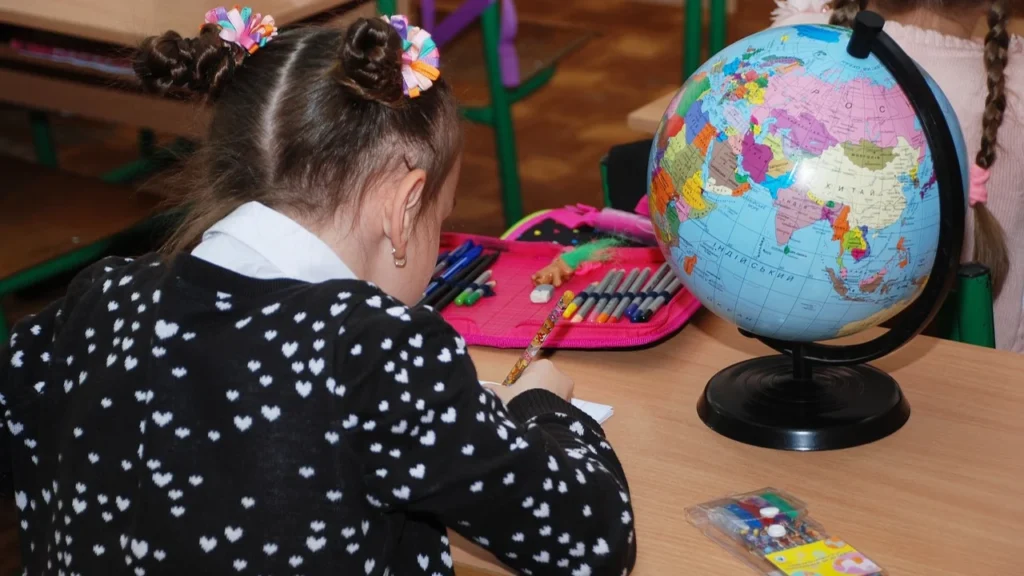
How to Know If Your Child Is Ready for Murfreesboro Day School
Deciding when your child is ready to transition from home or traditional childcare to an educational setting like Murfreesboro Day School can feel like a significant leap. But readiness isn’t measured by age alone—it’s about observing key developmental signs that indicate your child is prepared for a more structured and enriching environment. Fortunately, most children begin to show these signs naturally as their curiosity, independence, and desire to socialize begin to flourish.
One major indicator of readiness is your child’s growing interest in routines and independence. If they’re starting to follow simple instructions, express their needs clearly, or take pride in doing small tasks on their own—like dressing themselves or tidying up toys—those are strong cues that they’re ready for a school setting. Murfreesboro Day School is designed to nurture and expand on these abilities, helping children develop confidence in themselves while learning how to function within a group setting.
Another key signal is increased curiosity about the world around them. Does your child ask a lot of questions, mimic adult behaviors, or show enthusiasm for books, numbers, or creative play? These signs of intellectual and imaginative engagement are perfect foundations for the kind of exploratory learning that Murfreesboro encourages. Here, your child’s “why” and “how” questions are met with encouragement, guidance, and opportunities to experiment and discover answers through hands-on learning.
Social development also plays a vital role. If your child is beginning to enjoy the company of peers—even if they’re still learning to share or take turns—it’s a great time to introduce them to a community-oriented school environment. Murfreesboro Day School gently supports children through these early interactions, helping them build the social-emotional skills they’ll carry for life. Ultimately, if your child is showing signs of readiness across these areas, the nurturing, play-based structure of Murfreesboro will not only meet their needs but unlock their full potential.
Conclusion
In today’s fast-paced, achievement-driven world, early childhood education is no longer just a convenience—it’s a critical foundation for future success. Murfreesboro Day School redefines what families should expect from their child’s first learning experience. With a research-backed curriculum, certified educators, and an environment that balances safety with exploration, the school offers far more than just care. It delivers intentional, high-quality education that nurtures the whole child—mind, heart, and body.
What truly distinguishes Murfreesboro is its unwavering belief in every child’s potential. This is a place where young learners are seen as capable, creative, and worthy of meaningful challenges. Whether your child is discovering letters for the first time or learning to collaborate with peers, every milestone is celebrated as part of a bigger journey. This supportive, structured, and joyful approach allows children to not only prepare for elementary school, but to thrive well beyond it.
Choosing the right early learning environment can feel overwhelming, but the benefits of selecting a school like Murfreesboro are profound and lasting. Parents can rest easy knowing their children are in the care of dedicated professionals who truly understand what it means to educate—not just supervise—young learners. More importantly, children leave each day feeling confident, curious, and connected to a world of learning that excites and empowers them.
If you’re searching for more than daycare—if you’re seeking a place where your child’s future truly begins—then Murfreesboro Day School is ready to welcome your family. Schedule a visit, meet the teachers, and see firsthand how the school transforms the early years into something extraordinary. Because every child deserves a smart start—and every parent deserves to know they made the right choice.
Read MoreInside Murfreesboro Day School: A Purposeful Start That Prepares Children for Lifelong Success
Table of Contents
Introduction: Where Early Learning Sets the Tone for Life
The earliest stages of a child’s education are profoundly influential, shaping not only academic abilities but also how a child sees themselves and engages with the world. At Murfreesboro Day School, early learning is not treated as a warm-up for kindergarten—it is embraced as a critical time for laying deep, lasting foundations. These formative years set the tone for how children approach challenges, relationships, and personal growth for the rest of their lives.
This school’s philosophy is rooted in the understanding that children are not empty vessels to be filled, but eager learners and individuals already rich with potential. From the moment they walk through the door, children are met with an environment that values curiosity, play, and purposeful engagement. Classrooms are thoughtfully structured to foster independence while providing the gentle scaffolding that young learners need to succeed.
Each day is filled with opportunities for exploration and connection. Whether it’s discovering patterns in nature, expressing emotions through art, or solving problems with peers, every experience is meaningful. These aren’t just educational activities—they’re confidence-building milestones that help children internalize the belief that they are capable, valuable, and ready to learn.
At Murfreesboro Day School, early learning is a joyful journey. Children aren’t just being prepared for school—they’re being equipped for life, with the skills, mindset, and emotional resilience to thrive in any environment they encounter.
The Mission Behind Murfreesboro Day School’s Approach
The mission of Murfreesboro Day School is more than a statement—it’s a promise to every child and family that walks through its doors. At its core, the school exists to provide a purposeful, nurturing environment that inspires growth in all aspects of a child’s development. This commitment to the whole child influences every decision, from daily routines to long-term educational strategies.
This mission comes alive in the way classrooms are organized, how teachers engage, and how students are encouraged to discover their individual strengths. It recognizes that children thrive when they are seen, heard, and supported—not only as students, but as young people with emotions, dreams, and developing identities. Everything from the curriculum to the school’s culture is designed to reflect this deep respect for the learner.
Importantly, the school believes that emotional security is the bedrock of academic success. That’s why relationships come first—between students and teachers, among peers, and between the school and families. When children feel safe and supported, they are more willing to take intellectual risks, try new things, and ask important questions.
This mission-driven approach leads to outcomes that go far beyond school readiness. It results in children who are kind, curious, and confident—the type of individuals who not only succeed in the classroom but also lead with empathy and integrity in the world beyond it.

Whole-Child Development: More Than Just Academics
At Murfreesboro Day School, education is not confined to worksheets or standardized metrics—it’s a vibrant, dynamic experience designed to nourish every part of a child’s development. The school embraces the concept of whole-child education, which recognizes that academic, social, emotional, and physical growth are all interconnected and equally vital to long-term success.
In the classroom, literacy and numeracy skills are introduced through engaging, developmentally appropriate activities that emphasize understanding over memorization. But just as important are the moments when children learn to manage big emotions, resolve conflicts, take turns, or lead a small group. These soft skills are often underestimated, yet they’re essential to success in both school and life.
Creative expression is woven into every day through art, music, movement, and imaginative play. These experiences help children explore their interests, build confidence, and develop a strong sense of identity and voice. Physical play and outdoor learning are equally prioritized, reinforcing healthy habits and body awareness.
By nurturing the whole child, Murfreesboro Day School ensures that students don’t just meet developmental milestones—they become well-rounded, self-assured individuals equipped to engage meaningfully with their peers, their learning, and the broader world.
A Safe, Structured Environment That Builds Confidence
Children thrive in environments where they feel both secure and understood. At Murfreesboro Day School, safety and structure are not just policies—they are pillars that support every child’s sense of trust and belonging. From the moment a child arrives, they are greeted by familiar faces, clear routines, and thoughtfully prepared spaces that send a powerful message: you are safe, you are valued, and you are capable.
Physical safety is rigorously maintained through secure entry points, clean classrooms, and attentive supervision. Every area is age-appropriate, inviting, and organized to minimize overstimulation while still encouraging exploration. Safety drills and procedures are practiced regularly so that children know what to expect and how to respond in various situations—empowering them to feel in control, even during unexpected events.
But safety goes beyond the physical. Emotional safety is just as critical, and it’s woven into the daily rhythm of the school. Teachers greet children warmly, acknowledge their feelings, and help them navigate conflict with compassion and consistency. In this structured setting, students learn to take healthy risks, speak up, and ask for help—skills that are foundational to confidence both inside and outside the classroom.
The result is a school culture where children feel grounded, calm, and empowered to participate fully. Predictable routines build a sense of stability, while a nurturing atmosphere fosters resilience. Over time, children develop a quiet confidence that comes not from being the loudest or the fastest, but from knowing who they are and where they belong. At Murfreesboro Day School, structure isn’t rigid—it’s a framework for flourishing.
Curriculum Designed for Curiosity, Creativity, and Growth
At Murfreesboro Day School, the curriculum is far more than a checklist of academic goals—it’s a thoughtfully designed framework that sparks curiosity, encourages creativity, and supports meaningful growth. Every activity, lesson, and transition is intentionally planned to meet children where they are developmentally while gently guiding them toward new challenges and discoveries.
The learning environment is rich with opportunity. Children engage in hands-on experiences that deepen their understanding of core concepts in literacy, math, science, and social studies. Rather than relying on rote memorization, the curriculum invites children to question, explore, and connect ideas through sensory play, storytelling, building, and nature-based learning. This approach transforms education into an exciting journey, not just an outcome.
Creativity is nurtured daily through art, music, dramatic play, and open-ended projects that allow for personal expression and innovation. Children are encouraged to think outside the box, embrace their imagination, and develop problem-solving skills through playful experimentation. Whether it’s painting a self-portrait or designing a marble run, each experience helps children develop a sense of agency and pride in their ideas.
The curriculum also reflects a growth mindset philosophy, encouraging children to see mistakes as opportunities and to persist through challenges with resilience. Teachers offer just enough support to scaffold learning while empowering children to try, reflect, and adapt. At Murfreesboro Day School, learning is not only about gaining knowledge—it’s about cultivating the habits of lifelong learners who are curious, confident, and deeply engaged with the world around them.

Values-Driven Teaching That Shapes Character and Community
At Murfreesboro Day School, education extends far beyond academic achievement—it’s deeply rooted in shaping the kind of people children are becoming. Values like kindness, respect, responsibility, and empathy are not taught in isolation but are embedded in the daily culture of the classroom. These guiding principles help students learn how to treat others, navigate social dynamics, and understand their role in a larger community.
Teachers at Murfreesboro Day School are not only educators—they are mentors and role models who demonstrate these values through their interactions and responses. Whether it’s a moment of peer conflict or an opportunity for group cooperation, teachers use real-time guidance and gentle redirection to instill the lessons that help children grow into compassionate, ethical individuals. Children are taught how to apologize sincerely, offer help without being asked, and listen with respect—all through consistent, age-appropriate reinforcement.
Storytelling, role-play, and collaborative activities are used to explore moral and emotional concepts in ways that resonate with young learners. Discussions about fairness, inclusion, and problem-solving are part of everyday learning, helping children build a strong ethical foundation. These practices not only strengthen character—they create a harmonious classroom environment where all children feel safe, valued, and understood.
Over time, this values-driven approach cultivates a strong sense of community and social awareness. Children begin to see themselves as capable contributors to a shared space, and they carry this mindset with them into elementary school and beyond. At Murfreesboro Day School, character education isn’t a program—it’s a way of being that helps build not just successful students, but responsible, caring citizens.
Kindergarten Readiness: Academic and Emotional Preparation
At Murfreesboro Day School, preparing children for kindergarten goes far beyond teaching ABCs and 123s. True readiness involves a holistic combination of academic foundations, emotional maturity, and social confidence—and that’s exactly what the program is designed to develop. The school’s approach ensures that each child transitions to elementary school not just ready to learn, but eager, equipped, and resilient.
Academically, children build strong pre-literacy and early math skills through daily activities that promote phonemic awareness, vocabulary development, number recognition, patterning, and problem-solving. These skills are integrated into play-based learning that feels natural and engaging. Children don’t just memorize—they understand. They begin to make connections between sounds and symbols, quantities and operations, and stories and ideas, setting the stage for more structured instruction ahead.
Just as important as academics is the cultivation of emotional regulation and behavioral independence. Children learn how to sit for circle time, raise their hands, follow multi-step instructions, and cope with disappointment or frustration in appropriate ways. These abilities are essential for success in a classroom environment where children are expected to manage themselves as part of a larger group. Through guided support, they build the self-control and confidence they need to thrive in a more structured setting.
Social development is also a cornerstone of kindergarten readiness at Murfreesboro Day School. Through cooperative play, shared responsibilities, and intentional group work, children learn how to listen to others, take turns, and resolve conflicts respectfully. They begin to understand their role in a classroom community—and by the time they leave the program, they do so not only knowing how to count and write their names but with the social-emotional maturity to lead, contribute, and shine in kindergarten and beyond.
The Role of Teachers: Compassionate Experts in Early Education
At the heart of Murfreesboro Day School are its teachers—professionals who bring both exceptional expertise and heartfelt compassion into every classroom. These educators aren’t just instructors; they are guides, nurturers, and advocates who understand the tremendous influence early relationships have on a child’s development. Their presence is consistent, their encouragement is genuine, and their dedication to each student’s growth is unwavering.
Every teacher at Murfreesboro Day School is trained in early childhood education and deeply knowledgeable about developmental milestones, learning styles, and behavior management techniques. But it’s their ability to translate that knowledge into patient, personalized teaching that sets them apart. They adapt lessons to meet children where they are while gently encouraging them to stretch, try, and grow. Whether a child needs extra help with fine motor skills or is ready for more advanced math concepts, teachers tailor their approach accordingly.
Beyond academics, the teachers model empathy, kindness, and respectful communication—daily. Through their interactions, they teach children how to express emotions, solve problems, and engage in healthy social relationships. They create classrooms that feel safe, inclusive, and alive with possibility. In this environment, children feel not only supported but seen and celebrated for who they are.
The strong bond between teacher and child at Murfreesboro Day School fosters a powerful sense of trust and emotional security. That connection helps children become more confident, willing to participate, and eager to explore new challenges. Parents often speak of their gratitude for the loving attention their children receive and the positive, lasting impact that these early teachers have had on their child’s mindset, curiosity, and self-esteem.

Strong School-Home Partnerships that Support Every Child
At Murfreesboro Day School, education is viewed as a shared journey between families and educators. The school places immense value on building strong, respectful, and ongoing partnerships with parents, recognizing that children thrive best when there is alignment and collaboration between home and school. This philosophy creates a circle of support that uplifts every child, academically and emotionally.
Communication is at the heart of this partnership. Teachers provide regular updates through daily notes, photos, newsletters, and parent-teacher conferences, ensuring that families stay informed and engaged in their child’s development. Whether it’s a celebrated milestone or an area where extra encouragement is needed, parents are kept in the loop—not just as observers, but as active participants in their child’s growth.
Parents are also welcomed into the classroom community in meaningful ways. From volunteer opportunities and school events to take-home enrichment activities, the school invites families to contribute their time, talents, and perspectives. This level of involvement fosters a sense of belonging and mutual respect that children pick up on—they feel proud knowing that the important adults in their lives are working together on their behalf.
The results of this collaboration are powerful. When schools and families are united in purpose and communication, children feel more secure, more understood, and more confident. Murfreesboro Day School’s commitment to these partnerships ensures that every child receives consistent guidance, positive reinforcement, and a unified foundation of care, both inside and outside the classroom.
Why Families Choose—and Recommend—Murfreesboro Day School
When it comes to choosing an early education provider, families in Middle Tennessee consistently turn to Murfreesboro Day School—and it’s not hard to see why. Parents are drawn to the school’s intentional balance of academic excellence, emotional support, and strong values. But what truly sets the school apart is its genuine investment in each child’s success, which translates into visible, meaningful growth that families can see and feel every day.
Parents often speak of the joy their children bring home—the stories, the songs, the new skills, and the growing confidence that comes from being part of a community that truly sees and nurtures them. They appreciate the school’s welcoming atmosphere, the professionalism of the staff, and the structured yet flexible approach to learning that honors every child’s individuality. Many describe it as a place where their children are not just cared for, but deeply understood.
Beyond the classroom, families find reassurance in the school’s consistent communication, its commitment to transparency, and its thoughtful, proactive approach to problem-solving. Whether it’s addressing behavioral challenges with empathy or celebrating developmental milestones with genuine enthusiasm, Murfreesboro Day School fosters trust and loyalty that often extends beyond a single child’s enrollment. It’s common to see siblings follow in one another’s footsteps—and for families to recommend the school without hesitation to friends and neighbors.
Ultimately, what makes Murfreesboro Day School such a beloved choice is the sense of purpose and partnership that defines every relationship—between child and teacher, school and parent, learner and learning. It’s a place where families know their child is being prepared not just for kindergarten, but for life—with the confidence, compassion, and curiosity they need to flourish.
Conclusion: Building Bright Futures, One Child at a Time
At Murfreesboro Day School, early childhood education is not treated as a stepping stone—it’s recognized as the beginning of something extraordinary. Every moment, every lesson, and every relationship is intentionally crafted to nurture not only what children know, but who they are and how they grow. This is a place where learning is joyful, where safety and structure support exploration, and where values guide each step along the way.
Children leave Murfreesboro Day School with far more than kindergarten readiness. They walk out with a strong sense of self, a respect for others, and a love of learning that will carry them confidently into the future. The academic foundation they receive is solid, but it’s the emotional, social, and ethical grounding that truly distinguishes their experience. It’s an education of the whole child—for the whole of life.
For families, the decision to choose Murfreesboro Day School is more than a practical one—it’s a meaningful investment in their child’s potential. It’s the peace of mind that comes from knowing your child is being supported, challenged, and celebrated in an environment that mirrors the values you hold at home. It’s knowing your child is not only in good hands—but the right ones.
Bright futures don’t happen by accident—they begin with intention. At Murfreesboro Day School, that intention is clear, purposeful, and full of heart. Come see the difference for yourself—and discover why this is the smart start every child deserves.
Read More7 Powerful Reasons Why Murfreesboro Day School Is the Smart Start Every Child Deserves
Table of Contents
Introduction: Setting the Stage for Lifelong Success
The early years of a child’s education are not just important—they are foundational. These formative stages influence how children view themselves as learners, how they relate to others, and how they respond to challenges throughout life. What children absorb during this time—academically, socially, and emotionally—establishes the blueprint for their future development.
At Murfreesboro Day School, early education is more than a stepping stone—it’s a springboard. Each program is thoughtfully designed to create meaningful learning experiences that build confidence, inspire curiosity, and encourage resilience. The school’s approach is grounded in research-backed early childhood practices, infused with warmth, and executed with purpose.
Families seeking more than just child care find a true partner in Murfreesboro Day School—a school that understands how much these early years matter. With a focus on structured growth, nurturing relationships, and intentional instruction, the school creates an environment where children are prepared not just for kindergarten—but for life.
It’s not just about providing a good start. It’s about giving each child the best possible foundation for a future filled with success, confidence, and joyful learning.
Whole-Child Development: Nurturing Mind, Body, and Character
True education goes beyond memorization or test readiness. At Murfreesboro Day School, the goal is to cultivate the whole child—ensuring that every student grows intellectually, physically, emotionally, and socially. This comprehensive philosophy shapes every aspect of the curriculum, daily routines, and teacher-child interactions.
Children are naturally curious. The school harnesses that curiosity through rich learning experiences that spark critical thinking and problem-solving. Students are introduced to language, math, science, and creative arts in age-appropriate ways that feel more like discovery than instruction. Activities are hands-on, play-based, and purposeful—encouraging deep engagement and independent thought.
Recognizing and managing emotions is a key part of the learning journey. Educators at Murfreesboro Day School integrate social-emotional learning into the classroom experience through guided conversations, reflection exercises, and peer collaboration. Children learn how to express themselves appropriately, cope with big feelings, and build healthy relationships—skills that foster resilience both inside and outside the classroom.
Physical development is equally emphasized. Daily movement, outdoor play, and fine motor activities are embedded into the schedule to support coordination, balance, and strength. From structured gross motor games to artistic expression through hands-on crafts, students build confidence in their physical capabilities while learning about health and wellness.
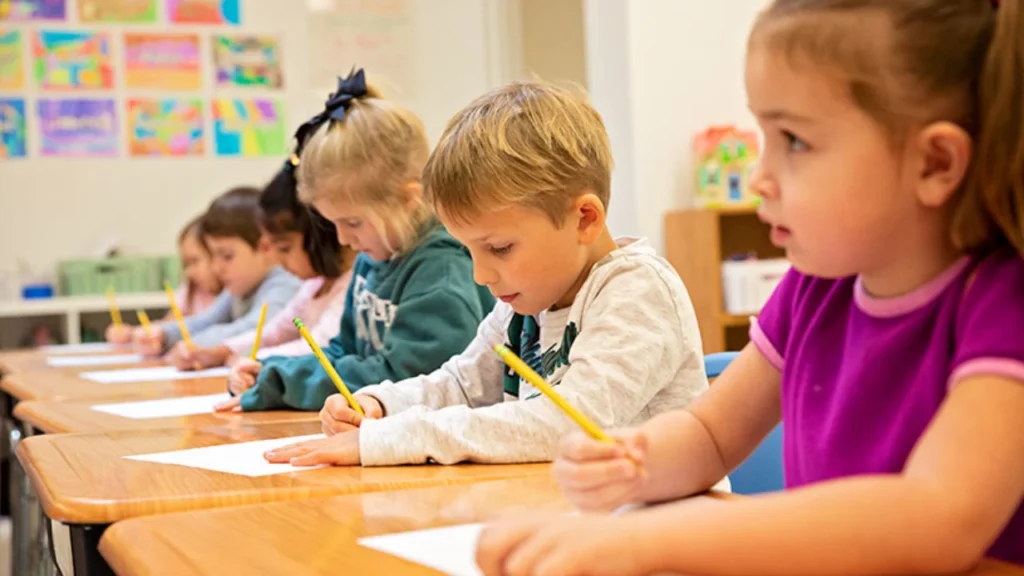
Safe, Structured Learning Environment that Parents Can Trust
For families, safety is never negotiable—and at Murfreesboro Day School, it’s a clear priority. The school has built a reputation on maintaining an environment where children feel protected, supported, and free to explore. From the moment families walk through the doors, they sense a calm, organized atmosphere built on care and intention.
Security begins at the perimeter. Monitored entryways, secure sign-in/sign-out procedures, and clear visitor policies ensure that only authorized individuals have access to the building. Classrooms and common areas are maintained with high standards of cleanliness and sanitation, supporting student health and wellness year-round.
Staff are trained in emergency preparedness, including fire, weather, and lockdown protocols. Regular drills help children practice safe responses in a reassuring and age-appropriate manner.
Young children crave predictability. That’s why Murfreesboro Day School follows thoughtfully crafted daily routines that give students a dependable rhythm to their day. From morning circle time to learning centers and outdoor play, each moment is intentional—helping students understand what comes next and how to engage with confidence.
This structured environment reduces anxiety, increases cooperation, and allows students to focus on discovery and connection. With routine comes reassurance—and with reassurance comes greater readiness to learn.
Certified, Compassionate Educators Who Go Beyond the Basics
Exceptional learning experiences begin with exceptional educators, and that’s exactly what you’ll find at Murfreesboro Day School. The teaching staff is composed of qualified professionals who bring not only certifications but also heart, experience, and a deep commitment to early childhood development.
Each educator is trained in developmentally appropriate practices, understanding how young children learn, communicate, and grow. But what truly sets the team apart is their ability to connect on a personal level. Teachers take the time to understand each child’s unique personality, learning style, and interests—making them feel genuinely seen and heard.
This personalized approach fosters trust, encourages independence, and builds strong emotional foundations that support both academic and personal success.
Educators use differentiated instruction to meet each child where they are. Whether introducing a new math concept, helping with social skills, or guiding through a moment of frustration, teachers remain calm, attentive, and intentional. Their presence is both instructional and nurturing, making classrooms a place where students feel safe enough to take risks and proud when they achieve.
By cultivating warm relationships and high expectations, the teaching staff at Murfreesboro Day School ensures that children are not only learning—but thriving.
Kindergarten Readiness: Academic and Social Preparedness
Transitioning to kindergarten is a major milestone, and Murfreesboro Day School prepares children to meet that moment with confidence. Through a curriculum that blends academic readiness with social-emotional development, students build the critical skills needed to succeed in elementary school—and far beyond.
Academic Foundations That Inspire Learning
From pre-literacy activities to introductory math concepts, students are immersed in experiences that lay the groundwork for lifelong learning. They engage in:
- Letter recognition, phonics, and vocabulary building
- Number sense, counting, patterns, and shapes
- Storytime, journaling, and emergent writing
- Scientific inquiry and hands-on discovery
This exposure to core academic content builds early proficiency while also nurturing a genuine love of learning.
Social Skills That Set the Stage for Success
Equally important are the social competencies children develop during their time at Murfreesboro Day School. These include:
- Taking turns and following directions
- Listening with focus and respect
- Working in small groups and sharing responsibility
- Managing emotions and resolving conflicts respectfully
Teachers guide students through these moments with intention, helping them learn how to navigate relationships and classroom dynamics with increasing independence.
By the time they graduate, students leave Murfreesboro Day School not only ready to meet the academic demands of kindergarten, but equipped with the resilience, empathy, and focus that will carry them through each new stage of growth.
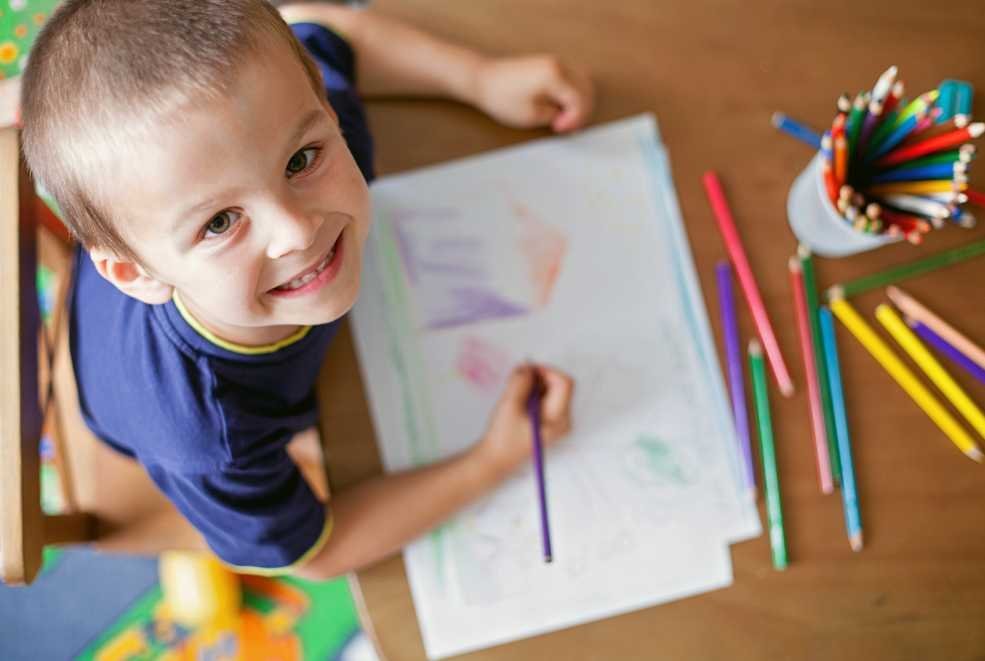
Purposeful Curriculum That Fosters Curiosity and Confidence
At Murfreesboro Day School, the curriculum isn’t just well-designed—it’s purposefully crafted to spark curiosity, encourage creativity, and develop a confident approach to learning. Every lesson, activity, and transition is aligned with both educational best practices and the developmental needs of young learners.
Young children learn best through hands-on, experiential activities. That’s why the curriculum blends structured academic instruction with play-based exploration, allowing students to make discoveries in ways that feel natural and engaging.
- In literacy, students explore letters and sounds through games, songs, and storytelling.
- In math, they build foundational concepts with manipulatives, puzzles, and real-world applications.
- In science, curiosity is fueled through experiments, nature walks, and sensory experiences.
- In the arts, students express themselves through music, movement, and visual creativity.
These daily experiences are more than just fun—they lay the groundwork for problem-solving, critical thinking, and independent learning that will serve students well for years to come.
The curriculum also emphasizes scaffolding—helping students gradually master more complex skills as they build confidence in their abilities. Teachers celebrate small wins, encourage persistence, and create an environment where children feel safe to try, fail, and try again.
This results in students who are not just capable, but self-assured and motivated, entering elementary school with a strong sense of ownership over their learning.
Values-Based Education: Teaching Respect, Empathy, and Responsibility
A truly exceptional early childhood education program must focus on more than academics—it must nurture character. At Murfreesboro Day School, teaching values isn’t an afterthought; it’s an integral part of the daily experience.
Core Values Embedded in the Day
The school emphasizes values such as:
- Respect for peers, adults, and the learning environment
- Kindness in words, actions, and problem-solving
- Responsibility for belongings, behavior, and learning tasks
- Empathy toward others’ emotions and perspectives
- Patience when facing challenges or working collaboratively
These values are consistently modeled by educators and reinforced through daily interactions, class discussions, and gentle guidance. Whether it’s learning to take turns, offering help to a friend, or using words to solve a conflict, students are given the tools and language to practice ethical behavior in real time.
By weaving values into both academics and social routines, Murfreesboro Day School helps children develop a moral compass that grows alongside their intellect. This intentional character-building fosters a strong sense of community within the classroom and creates ripple effects that extend into homes and neighborhoods.
Students don’t just learn how to be good classmates—they learn how to be good people.
Engaging, Age-Appropriate Classrooms Designed for Growth
The learning environment plays a critical role in how children absorb information, interact with others, and navigate their day. At Murfreesboro Day School, every classroom is thoughtfully designed to be a safe, stimulating, and developmentally appropriate space that encourages exploration, imagination, and independence.
Spaces That Encourage Movement and Choice
Each room is arranged into distinct learning areas that support different types of engagement, such as:
- Reading corners for quiet time and literacy development
- Art centers for creative expression and fine motor practice
- Building stations that foster problem-solving and collaboration
- Science and sensory tables that invite inquiry and hands-on discovery
- Dramatic play areas that encourage storytelling and role play
Children are invited to move between activities with autonomy, learning how to make choices, manage transitions, and engage with their environment with intention.
All materials—whether books, toys, tools, or art supplies—are carefully selected to match the interests and abilities of each age group. Safety and functionality are always top priorities, but so is inspiration. The goal is to create a space that speaks to the natural curiosity of a child while offering opportunities for meaningful growth in every corner.
With clean, bright, and beautifully organized classrooms, Murfreesboro Day School creates a physical space where children feel at ease, inspired, and ready to learn.
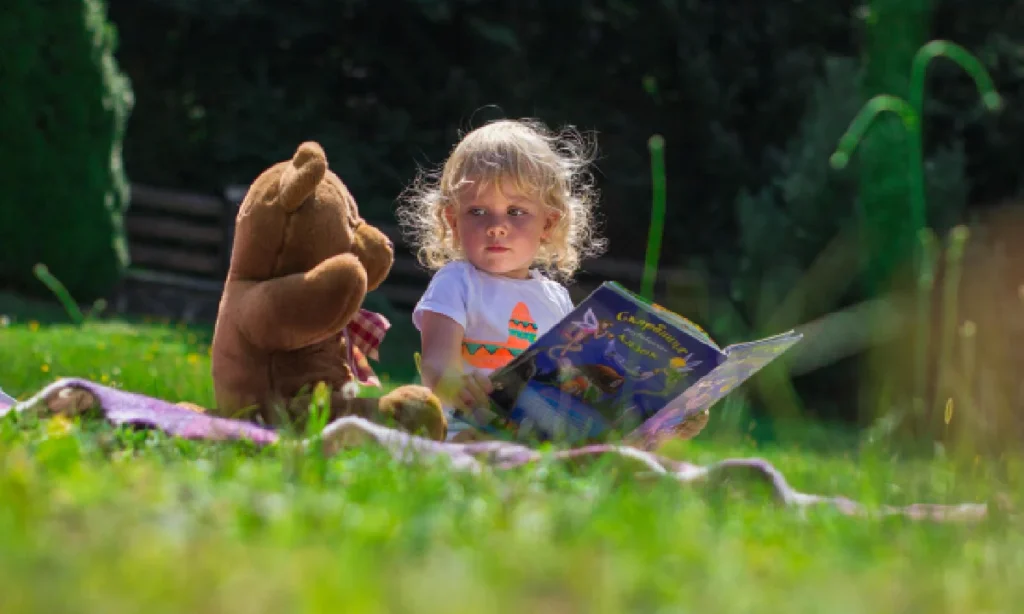
Strong Parent-School Partnerships That Empower Families
At Murfreesboro Day School, education is viewed as a collaborative effort, not a one-way street. The school deeply values the role parents and guardians play in a child’s development and actively works to build strong, respectful partnerships with each family.
Open Communication That Builds Trust
Families are kept fully informed and connected through:
- Daily updates via apps or written reports
- Regular parent-teacher conferences to align on goals and progress
- Responsive communication channels for questions and concerns
- Invitations to participate in classroom activities and school-wide events
Teachers don’t just deliver information—they listen. They seek input from families, share insights about a child’s growth, and partner with parents to address challenges or celebrate milestones. This level of consistent, transparent communication creates a sense of trust and alignment that is essential to a child’s success.
From guest reading days and seasonal celebrations to curriculum showcases and community events, Murfreesboro Day School welcomes families into the learning experience. Parents aren’t just observers—they’re engaged collaborators who feel valued and empowered in their child’s educational journey.
This intentional partnership reinforces classroom lessons at home, builds emotional continuity for the child, and sends a powerful message: We’re in this together.
A Reputation Built on Results, Relationships, and Trust
In a community where parents have many choices for early childhood education, Murfreesboro Day School stands apart—not because of marketing or flash, but because of something far more enduring: a reputation earned through consistent results, meaningful relationships, and unwavering trust.
Over the years, Murfreesboro Day School has become a household name among families who value quality, intentionality, and heart in their child’s early learning experience. This reputation isn’t built on chance. It’s built on delivering what truly matters to families—measurable growth, personalized care, and a school culture that puts children and parents first.
Families choose Murfreesboro Day School because they see progress—not only on paper, but in the daily confidence, independence, and joy their children carry home. Whether it’s a toddler learning to communicate emotions, a preschooler writing their name for the first time, or a pre-kindergartener proudly reading aloud, the evidence of growth is tangible.
Students leave the program not only academically prepared for kindergarten but socially equipped and emotionally resilient. Parents routinely comment on the transformation they see in their children—more focus, more empathy, better self-regulation, and a genuine excitement about learning.
These outcomes speak for themselves—and they speak loudly. It’s why so many families choose to return with younger siblings, and why the school’s strongest source of growth continues to be word-of-mouth recommendations from parents who have experienced the difference firsthand.
At the heart of Murfreesboro Day School’s reputation is its deeply rooted commitment to relationship-building. Teachers, administrators, and staff are more than professionals—they are trusted partners who know each child by name and each family by story. This relational approach fosters a strong sense of belonging and makes the school feel more like an extended family than an institution.
Families are not treated as spectators—they are engaged collaborators. Whether it’s a quick check-in at pickup, a thoughtful email about a child’s progress, or an invitation to a classroom celebration, Murfreesboro Day School ensures parents feel seen, heard, and included every step of the way.
These relationships build trust. And trust builds loyalty.
A Culture of Care That Inspires Confidence
Every policy, every practice, and every interaction at Murfreesboro Day School is grounded in a culture of care and intentionality. From safety procedures to curriculum design, nothing is left to chance. The school sets high standards—and meets them daily—because children deserve nothing less.
This commitment to excellence is not a trend—it’s the foundation of the school’s identity. It’s why generations of families have stayed with Murfreesboro Day School, referred others, and returned year after year. They know their child is in a place where wellbeing, growth, and character development are not just valued—they are prioritized.
Conclusion: The Smart Start That Shapes a Brighter Future
The earliest years of a child’s life are more than just a phase—they are the foundation of everything to come. From the first friendships formed to the first letters written and questions asked, these moments help shape how a child sees the world—and how they see themselves in it.
At Murfreesboro Day School, these foundational years are approached with careful intention and unwavering purpose. The school’s mission is clear: to provide every child with the skills, character, and confidence they need to not only succeed in the classroom but to flourish in life. That mission is reflected in every structured routine, every kind word spoken, and every joyful learning opportunity created.
The school’s commitment to whole-child development ensures that learning isn’t limited to academics—it includes emotional intelligence, social growth, creativity, and physical well-being. Through a secure, engaging environment and a curriculum rooted in curiosity, students emerge as thoughtful, independent, and compassionate learners.
What truly sets Murfreesboro Day School apart is its ability to balance professional excellence with a personal, heartfelt approach. Teachers don’t just instruct—they connect. They nurture confidence. They celebrate individuality. And they recognize that education is most powerful when parents, teachers, and children grow together.
For families searching for more than just a preschool—for those who seek a place of purpose, partnership, and possibility—Murfreesboro Day School offers an unmatched beginning. It’s where strong habits are formed, lasting values are instilled, and lifelong love for learning is born.
Read More
![Unlock Early Childhood Education Excellence at Murfreesboro Children’s Academy: 7 Inspiring Reasons Parents Trust Us. Introduction Early childhood education represents a critical phase in a child’s cognitive, emotional, and social development, serving as the cornerstone of lifelong learning. At Murfreesboro Children’s Academy, we understand that […]](https://dayschools.org/mca/wp-content/uploads/2025/07/Day-School-7-750x460.webp)
![Early Learning Excellence: 5 Inspiring Reasons Parents Choose Murfreesboro Children’s Academy Introduction: A Place Where Young Minds Flourish Early learning at Murfreesboro Children’s Academy is more than an academic journey—it is the beginning of a lifelong love for discovery. From the […]](https://dayschools.org/mca/wp-content/uploads/2025/05/Murfreesboro-Childrens-Academy-14-750x460.webp)
![Nurturing Young Minds: Inside Murfreesboro Children’s Academy’s Innovative Approach to Early Education Introduction: Redefining Early Education Murfreesboro Children’s Academy redefines what early education can achieve by treating the preschool years not as a precursor to “real” learning, but as the critical foundation […]](https://dayschools.org/mca/wp-content/uploads/2025/05/Murfreesboro-Childrens-Academy-750x460.webp)
![Murfreesboro Day School: 5 Powerful Reasons It’s More Than Just Daycare for Early Learners Introduction For many parents, the word “daycare” carries a connotation of custodial care—a safe space where children are simply watched over while adults are at work. The emphasis in these […]](https://dayschools.org/mca/wp-content/uploads/2024/09/day-school-5-1-750x460.webp)
![Inside Murfreesboro Day School: A Purposeful Start That Prepares Children for Lifelong Success Introduction: Where Early Learning Sets the Tone for Life The earliest stages of a child’s education are profoundly influential, shaping not only academic abilities but also how a child sees […]](https://dayschools.org/mca/wp-content/uploads/2024/09/day-school-12-750x460.webp)
![7 Powerful Reasons Why Murfreesboro Day School Is the Smart Start Every Child Deserves Introduction: Setting the Stage for Lifelong Success The early years of a child’s education are not just important—they are foundational. These formative stages influence how children view themselves as learners, […]](https://dayschools.org/mca/wp-content/uploads/2024/09/day-school-8-750x460.webp)